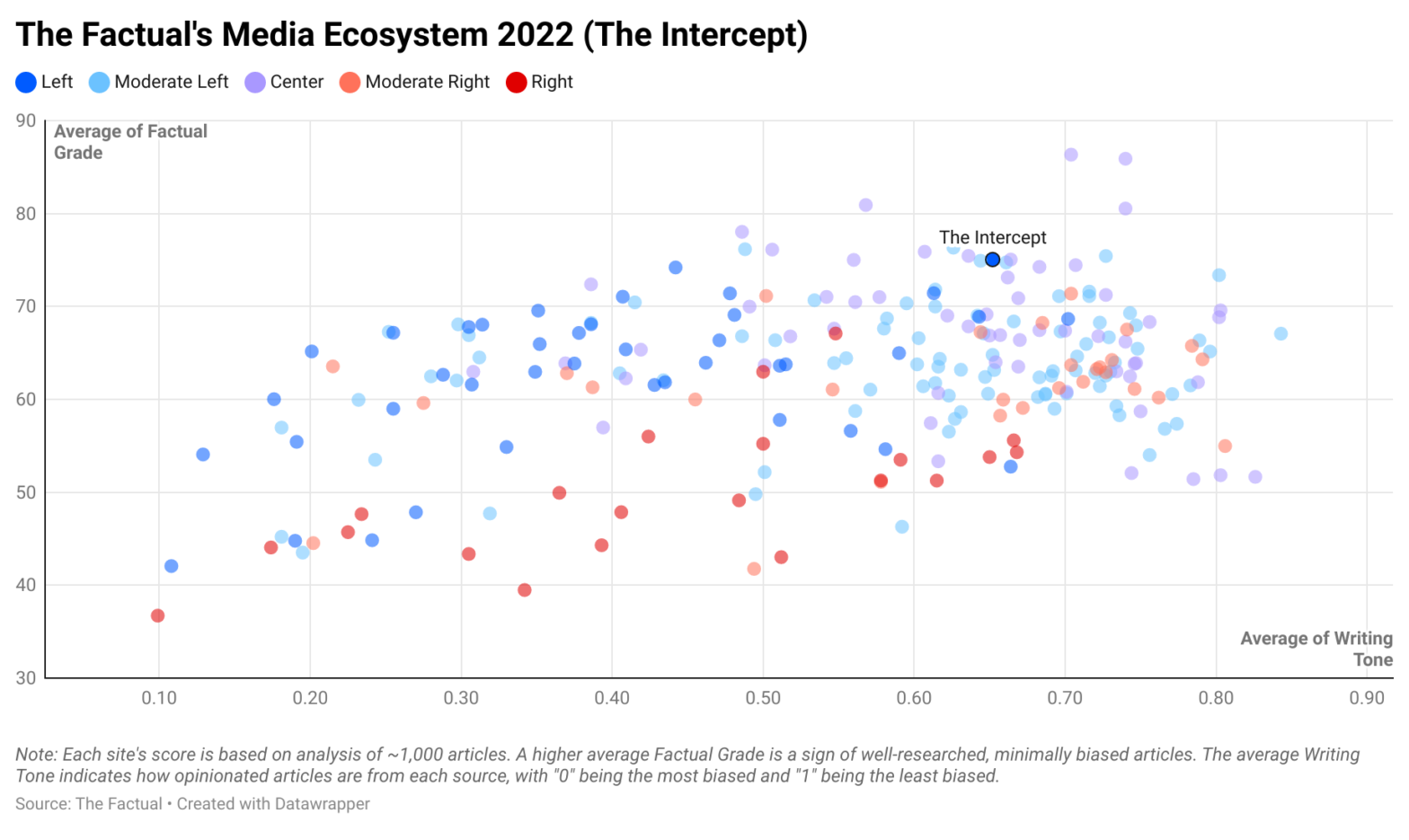The Intercept is a news organization that focuses on “holding the powerful accountable through fearless, adversarial journalism.” The organization has a reputation as a refuge for world-class, independent journalists but also has a checkered past. Several of its co-founding editors have left due to editorial disagreements, and one former author was fired for deceptive journalistic practices. So, how reliable is The Intercept and how biased is its reporting?
How Does The Factual Rate News Sources?
The Factual analyzes more than 10,000 news stories every day to help readers find the most informative, least-biased articles. Our news-rating algorithm scores each article along four metrics: (1) cited sources and quotes, (2) publication history, (3) writing tone, and (4) author expertise. These scores combine in a weighted average we call a Factual Grade, which ranges from 0–100%. (See our How It Works page to learn more about our algorithm.)
For this study, we analyzed ~1,000 articles each from 240 news sources. The average Factual Grade for the entire dataset was 62.5%. Based on these averages, we can compare the performance of news sites across the media ecosystem. The entire dataset can be explored in greater detail here.
How Factual Is The Intercept?
The Intercept scored an average Factual Grade of 75.0%, placing it in the 95th percentile of our dataset. This is the 13th-highest score for all sites that we analyzed.
The Intercept’s high scores are driven by several factors, including highly experienced authors and high sourcing standards. For example, The Intercept boasts a deep bench of experienced journalists with strong histories of investigating specific topics. This means that authors regularly write in the same topic area and bring relevant expertise to each story. Likewise, the site exhibits particularly high attention to adequate sourcing of information, so articles tend to incorporate numerous links to other high-quality sources or direct quotations relevant to the subject material.
Like any news source, scores for articles from The Intercept vary widely based on factors like author expertise and cited evidence. For example, some scored above 90%, while others scored below 60%.
Please check your email for instructions to ensure that the newsletter arrives in your inbox tomorrow.
How Opinionated Is The Intercept?
One of the metrics The Factual uses is the Writing Tone, which measures how opinionated the writing is in an article. For this metric, the algorithm looks for signs of subjective commentary (e.g., first person pronouns and unnecessary adverbs), as well as the emotional nature of selected words, and sees how prevalent they are for a given length of text. More neutral text receives higher ratings, with “0” being the most opinionated and “1” being the most neutral.
The Intercept had an average Writing Tone score of 0.65, placing it in the 60th percentile in our dataset. This suggests that articles from The Intercept are somewhat opinionated on average. One can find examples of highly opinionated pieces, such as “I Tried to Make Claims About Election Fraud So Preposterous Trump Fans Wouldn’t Believe Me. It Was Impossible.,” and highly neutral pieces, such as “Joe Biden Is Filling Top Pentagon Positions with Defense Contractors.”
What Is The Intercept’s Political Bias?
The Factual classifies news sites by political bias as either Left, Moderate Left, Center, Moderate Right, or Right. This classification comes from third-party assessments from media bias organizations such as AllSides and Media Bias/Fact Check (MBFC). Based on this data, The Factual assigns The Intercept a Left bias.
AllSides classifies The Intercept as having a “Left” bias based on independent research and 8,008 community ratings, though they have not yet completed a full review of the publication. In the absence of a thorough review, AllSides highlights the site’s separation from co-founding editor Glenn Greenwald. Greenwald criticized editorial practices that led to “censorship” of an article he wanted to publish that was critical of then-candidate Joe Biden. The Intercept’s editor-in-chief responded by rebuking Greenwald’s claims and pointing to numerous other articles critical of Biden. AllSides also highlights The Intercept’s declared editorial approach that “does not mean mandating ‘balance’ when one perspective on a subject — such as the science of climate change, or the justification for a war crime — is clearly without merit.”
MBFC similarly classifies The Intercept as “Left,” pointing to “story selection that routinely favors the left.” They also rate the site as “mostly factual” due to previously fabricated work and “censorship of writers.” While MBFC also mentions the Greenwald incident, they generally highlight the site’s tendency toward opinionated writing that eschews standard left-right politics and elevates progressive left perspectives. They give the site credit for using highly credible sources but also acknowledge that many stories exhibit opinionated language.
Please check your email for instructions to ensure that the newsletter arrives in your inbox tomorrow.
Who Owns The Intercept?
The Intercept is a non-profit organization originally founded by a team of editors with financial backing from eBay founder Pierre Omidyar. Today, the organization reports running through “the generosity of its members ... and institutional contributors.” Despite efforts to generate more support from individuals, the Columbia Journalism Review reported in 2019 that the organization was still largely supported by Omidyar’s contributions.
Why Does It Matter?
News articles always have some bias because all authors have some frame of reference within which they describe a story. Political bias ratings are helpful in understanding this framing. However, it can be more beneficial to know how factual an article is based on quantifiable metrics that can be seen across the media ecosystem, such as cited evidence, author expertise, and writing tone. This is what The Factual ascertains.
Reading several, highly rated articles from across the political spectrum helps counter the bias of any news source or story. To have the day’s most factual news stories delivered to your inbox every morning, subscribe to our daily newsletter.
This article was updated on September 20, 2022 to reflect new data.

